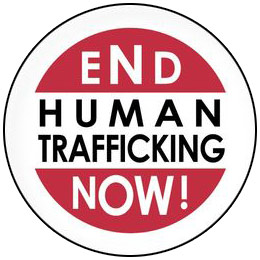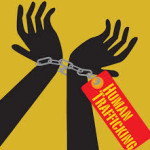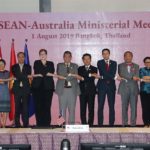
Prime Minister Prayut Chan-o-cha has ordered his government to enhance coordination between police, prosecutors and the courts in the fight against human trafficking so that trafficking syndicate leaders can be brought to justice and a more systematic and effective approach to the problem can be employed.
The Prime Minister vowed to find and prosecute the leaders of human trafficking syndicates and file criminal charges against any government officials implicated in the nefarious activity. National Police Chief Gen. Somyot Pumpunmuang assigned one of his top deputies to oversee a review and re-investigation of 1,300 trafficking cases from recent years to try and extract more information that will lead to the arrests of ringleaders.
The new push on enforcement comes after The Associated Press reported on fishermen stranded in Indonesia who had been trafficked and used as forced labor by Thai trawlers. The fish caught by the trawlers was reportedly sold to seafood processing companies in Thailand.
“Not only will the Thai Government take serious measures against all companies, large or small, that continue to take advantage of their employees with no regards for human rights, but these companies will also be permanently shut down and face legal charges, “ said Prime Minister Prayut during his weekly address last Friday. Reiterating his Government’s “zero tolerance” policy to human trafficking, the Prime Minister stressed the Government “will do whatever it takes to fight human trafficking.”
A senior government official told the Bangkok Post that the prime minister wants greater coordination between various state agencies working on the human trafficking problem and to tackle it at its root causes. A “working in silos” approach has resulted in traffickers slipping through the cracks and continuing to operate with near impunity.
Panitan Wattanayagorn, a security advisor to the government, said six to 10 human trafficking networks are involved in the 200-plus human trafficking cases currently being prosecuted.
He said the government is setting up a case system database to better monitor human trafficking, find linkages that might be overlooked that could aid investigations and prosecutions, and provide better information to outside monitors, such as the United States Department of State, which downgraded Thailand in its last annual report on Trafficking in Persons.
“Without statistics and data collection, the U.S. sees us as inactive on the issue. This year is the first year we have developed statistical data on human trafficking cases,” Panitan said.
The government is also considering setting up a special court to deal with human trafficking cases. To ensure justice against traffickers will be swift, the head of the Supreme Court said last week said that he favors setting an 84-day time limit for police and prosecutors to complete their investigations and bring human trafficking cases to court.
If there is any reason for a delay in a verdict, the judge responsible must report the reason to their superiors and request an extension, which would be for a maximum of six months.
Other measures to further improve the prosecution process include pre-trial depositions, allowing witnesses especially women and children to testify without having to face defendants, and allowing testimonies via videoconference in cases where victims have left Thailand or are working elsewhere.
Furthermore, the Government has been working to register 1.6 million foreign migrant workers so they are documented, legal and can avoid falling into the hands of traffickers. It also requires thousands of commercial fishing vessels to install tracking systems to authorities can monitor their locations. The second measure is intended both to fight human trafficking and pirate fishing, also known as illegal, unregulated and unreported (IUU) fishing. IUU fishing is a problem for all maritime nations in Southeast Asia and many other regions.




